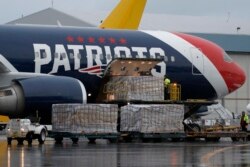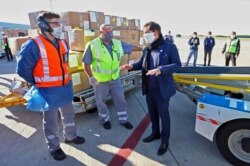The spread of the coronavirus has placed severe pressure on the world’s health care system. It also has shown worldwide dependence on China for medical supplies and drugs.
China holds an important position in the world market for active pharmaceutical ingredients (API), the substances that make up the drugs people use. China also is a top producer of supplies such as thermometers, medical face coverings and other equipment.
The outbreak of the coronavirus in Wuhan, China, in December worried industry experts. They knew that reduced production could lead to severe medical shortages around the world.
In the U.S.
In the United States, President Donald Trump has called for the return of supply chains from outside the country. And American lawmakers appear to be willing to take some action.
Anna Ashton is senior director of government affairs with the US-China Business Council. She said, “We are seeing at least 10 bills that focus on ensuring the security of pharmaceutical supply chains.”
A number of proposals would require the Food and Drug Administration (FDA) and other agencies to find out where drugs come from. And Republican Senator Tom Cotton of Arkansas has introduced a new bill to ban the use of federal money to buy drugs manufactured in China.
However, drug companies have expressed concern about having to quickly move their supply chains back to the U.S. The industry group Pharmaceutical Research and Manufacturers of America warned that such moves take time. Spokesperson Nicole Longo emailed VOA saying building a factory can take five to 10 years and “can cost as much as $2 billion.”
William McLaury is a professor at Rutgers Business School. He also directed the supply chain of drug maker Novartis Pharmaceuticals Corporation for more than 30 years before joining the university. He said the U.S. would need to help companies with the cost of returning to America. He noted that production in the country would have to be increased while waiting for government approval of new supplies.
Ashton said discussions are still ongoing and will take time. But, she said she believed, “…we will see some sort of legislation make its way through the process this year.”
Japan and France
The United States is not the only country facing this problem. Many countries including Japan, France and Germany are in a similar situation. Those countries have lost the ability to make some medicines as the worldwide health crisis interferes with supply chains. Most of the drug ingredients are supplied by other countries.
The Japanese government has moved to ease the problem. On April 7, the government of Prime Minister Shinzo Abe announced $2 billion in aid to help Japanese companies move suppliers back to Japan. On May 12, the government said it had begun to work with more than 400 Japanese companies to increase production.
In Europe, French President Emmanuel Macron has promised “full independence” in producing face masks by the end of the year. He said France needs to reach independence in other important medical supplies. The French pharmaceutical company Sanofi has promised to form a new Europe-based business to reduce dependence on Asian drug making.
I’m Mario Ritter Jr.
Lin Yang reported this story for VOANEWS. Mario Ritter Jr. adapted it for VOA Learning English. Hai Do was the editor.
________________________________________________________________
Words in This Story
pharmaceutical –n. related to the production and sale of drugs and medicines
ingredient(s) –n. materials used to make a food, medicine or similar product
supply chain –n. a network of businesses that provide the materials, manufacturing and services necessary to create the products of an industry for customers in a certain market
tend –v. what often happens







